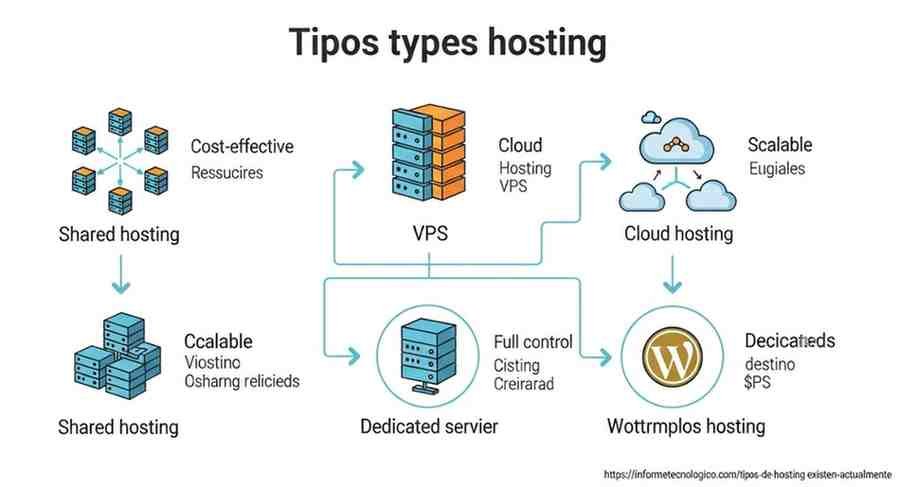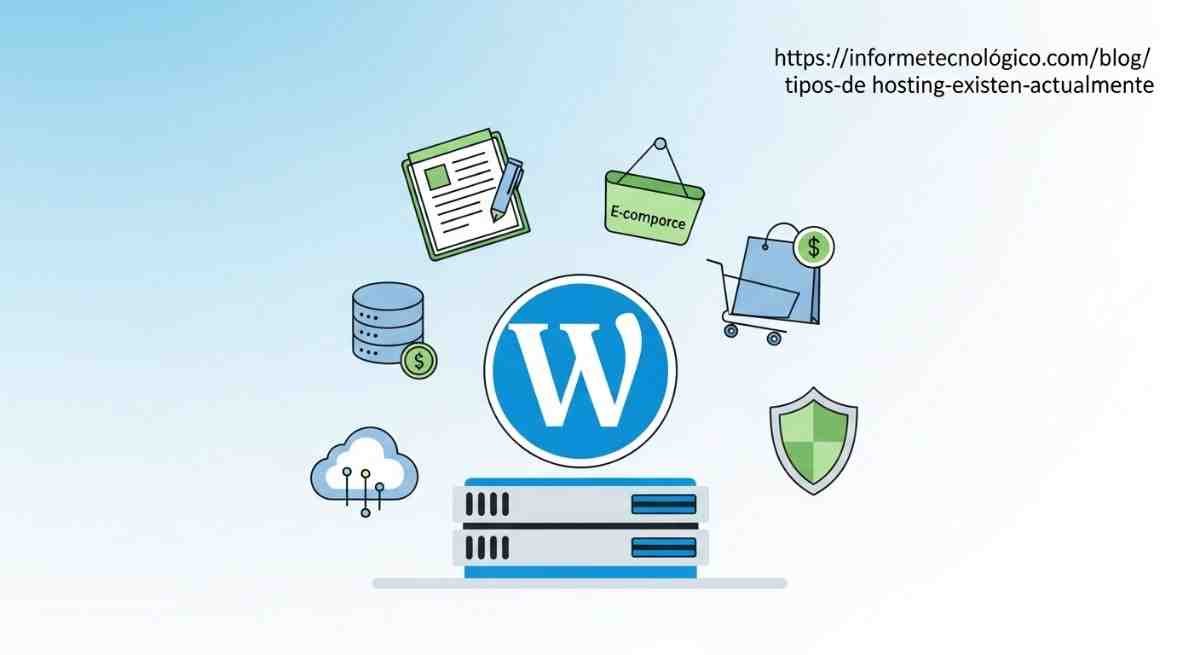Types of Hosting Available Today — A Practical Guide
Choosing the right web hosting can make or break your online presence. Whether you’re launching a personal blog, running an eCommerce store, or managing a high-traffic enterprise application, understanding the types of hosting available today is essential for optimal site performance, security, and scalability. Poor hosting choices lead to slow load times, frequent downtime, and frustrated visitors—problems that can cost you traffic and revenue.
In this comprehensive guide, we’ll explore the main hosting options—shared hosting, VPS hosting, cloud hosting, dedicated servers, and WordPress hosting—and help you determine which solution fits your specific needs and budget. For a deeper dive into these concepts, you might also explore resources like https://informetecnologico.com/blog/tipos-de-hosting-existen-actualmente, which provides additional technical insights.
By the end of this article, you’ll understand the key differences between hosting types, how to evaluate server resources and scalability, and which option delivers the best value for your project.
What Are the Main Types of Hosting?
Web hosting comes in several distinct flavors, each designed for different use cases, technical requirements, and budgets. Let’s break down the five primary hosting types you’ll encounter today.
Shared Hosting
Shared hosting is the most affordable and beginner-friendly option available. With shared hosting, your website lives on a server alongside dozens or even hundreds of other sites. All sites share the same server resources—CPU, RAM, storage, and bandwidth—which keeps costs low but can impact performance during traffic spikes.
Who It’s For:
- Personal blogs and hobby sites
- Small business websites with moderate traffic
- Portfolio sites and landing pages
- Anyone on a tight budget looking for cheap web hosting
Pros:
- Extremely affordable — plans often start at $3–10 per month
- Easy to set up — most providers offer user-friendly control panels like cPanel
- Maintenance included — the hosting company handles server updates and security patches
- Perfect for beginners — no technical expertise required
Cons:
- Limited server resources — high traffic on neighboring sites can slow your site down (the “noisy neighbor” problem)
- Performance limitations — not suitable for resource-intensive applications
- Restricted customization — limited access to server configuration
- Security concerns — vulnerabilities in one site can potentially affect others
Real-World Example: A personal food blogger using shared hosting can easily handle 5,000–15,000 monthly visitors with fast load times and minimal cost.

VPS Hosting (Virtual Private Server)
VPS hosting offers a middle ground between shared and dedicated hosting. While multiple sites still share a physical server, virtualization technology partitions the server into isolated environments. Each VPS gets dedicated server resources—guaranteed CPU, RAM, and storage that no other user can touch.
How It Works: A hypervisor divides one physical server into multiple virtual machines, each operating independently with its own operating system, resources, and root access. You get much more control than shared hosting without paying for an entire dedicated server.
Who It’s For:
- Growing websites outgrowing shared hosting
- Developers needing root access for custom configurations
- Small to medium eCommerce sites
- Businesses requiring better security and performance
Pros:
- Dedicated resources — your allocated CPU and RAM are guaranteed
- Better performance — immune to the “noisy neighbor” effect
- Root access — full control to install custom software and configure settings
- Scalability — easy to upgrade resources as your site grows
- Cost-effective — significantly cheaper than dedicated servers
Cons:
- Technical knowledge required — unmanaged VPS plans require server administration skills
- More expensive than shared — typically $20–100+ per month
- Responsibility for maintenance — unless you choose managed VPS, you handle security and updates
Key Insight: VPS hosting bridges the gap between budget hosting and enterprise solutions, making it ideal for businesses experiencing growth.
Cloud Hosting
Cloud hosting leverages multiple interconnected servers (a server cluster) to host your website, rather than relying on a single physical machine. This distributed architecture provides unprecedented reliability, scalability, and performance.
How It Works: Your website’s files and data are distributed across multiple servers in different locations. If one server fails, another instantly takes over, ensuring high availability and minimal downtime. Resources can be scaled up or down automatically based on demand.
Benefits and Scenarios:
- Exceptional uptime — redundancy across multiple servers means 99.9%+ availability
- Infinite scalability — handle traffic spikes effortlessly by tapping into additional resources
- Pay-as-you-go pricing — only pay for the resources you actually use
- Global reach — content delivery from multiple data centers improves site performance worldwide
- Load balancing — traffic is distributed intelligently across servers
Who It’s For:
- High-traffic websites with variable demand
- eCommerce sites that experience seasonal traffic spikes
- SaaS applications requiring high availability
- Businesses prioritizing uptime and reliability
Pros:
- Maximum reliability — no single point of failure
- Flexible resource allocation — scale instantly during traffic surges
- Performance optimization — faster load times through distributed infrastructure
- Enterprise-grade infrastructure — used by major companies worldwide
Cons:
- Complex pricing — costs can be unpredictable with pay-as-you-go models
- Steeper learning curve — more complex than traditional hosting
- Potentially higher costs — can exceed VPS pricing during sustained high traffic
- Vendor lock-in risks — migrating between cloud providers can be challenging
Cloud Hosting vs Traditional Hosting: Traditional hosting relies on a single server, making it vulnerable to hardware failures. Cloud hosting distributes risk and resources across multiple machines, delivering superior reliability and scalability.
Dedicated Server Hosting
Dedicated server hosting gives you an entire physical server exclusively for your website. No sharing, no neighbors—just raw power and complete control. This is the premium option for sites with massive traffic, strict security requirements, or resource-intensive applications.
Who Should Choose a Dedicated Server:
- Large eCommerce platforms processing thousands of transactions daily
- High-traffic media sites and streaming platforms
- Enterprise applications with strict compliance requirements
- Gaming servers and resource-intensive web applications
- Organizations requiring maximum security and data isolation
Pros:
- Complete control — full root access and server customization
- Maximum performance — all server resources dedicated to your sites
- Enhanced security — physical isolation from other users
- Customizable hardware — choose exact CPU, RAM, storage, and bandwidth specs
- Predictable performance — no resource competition
Cons:
- Expensive — plans typically start at $100–300+ per month
- Requires expertise — server administration knowledge essential unless managed
- Your responsibility — security, updates, and maintenance fall on you
- Fixed resources — scaling requires hardware upgrades or migration
When to Upgrade to Dedicated: Consider dedicated hosting when your VPS regularly maxes out resources, you need guaranteed performance for critical applications, or compliance requirements demand physical server isolation.
WordPress Hosting
WordPress hosting is a specialized hosting environment optimized specifically for WordPress sites. These plans include WordPress-specific features like one-click installation, automatic updates, enhanced security, and performance optimizations that make running a WordPress site easier and faster.
Managed Features and Advantages:
- Pre-installed WordPress — site ready immediately after signup
- Automatic updates — WordPress core, themes, and plugins stay current
- WordPress-optimized servers — caching, CDN integration, and performance tuning
- Enhanced security — WordPress-specific firewall rules and malware scanning
- Expert support — support teams trained in WordPress troubleshooting
- Staging environments — test changes safely before going live
- Daily backups — automated backups with one-click restore
Who It’s For:
- WordPress bloggers and content creators
- Small business owners without technical expertise
- Digital marketers managing multiple WordPress sites
- Anyone wanting hassle-free WordPress management
Is WordPress Hosting Better Than Shared Hosting for Blogs? Yes, for serious WordPress users. While shared hosting can run WordPress, dedicated WordPress hosting offers superior speed, security, and convenience. The performance difference is noticeable, especially as your site grows. However, basic bloggers on a tight budget may find standard shared hosting sufficient initially.
Pricing Range: WordPress hosting typically costs $10–50 per month for managed plans, positioning it between shared and VPS hosting in price.
Key Technical Differences & Performance Factors
Understanding the technical specifications behind each hosting type helps you make informed decisions. Here are the critical factors that impact your site’s performance and user experience.
Server Resources:
- CPU (Processor) — determines how quickly your server processes requests and runs scripts
- RAM (Memory) — affects how many simultaneous visitors and processes your site can handle
- Storage — traditional HDDs are cheaper but slower; SSDs (Solid State Drives) offer dramatically faster read/write speeds
- Bandwidth — the amount of data transferred between your server and visitors; unlimited bandwidth is common but may have fair-use policies
Shared hosting typically allocates limited, shared resources. VPS provides dedicated resource allocations (e.g., 2 CPU cores, 4GB RAM). Cloud hosting offers dynamic resources that scale automatically. Dedicated servers give you the entire machine’s resources.
Storage and Disk Space:
- Shared: 10–100GB (often sufficient for small sites)
- VPS: 20–200GB SSD (better performance)
- Cloud: Flexible, pay for what you use
- Dedicated: 500GB–multiple TB, customizable
Control Panels and Root Access:
- Shared hosting provides simplified control panels (cPanel, Plesk) without root access
- VPS and dedicated offer full root access for complete server control
- Managed WordPress hosting provides WordPress-specific dashboards
- Cloud platforms offer proprietary management interfaces (AWS Console, Google Cloud Platform)
Uptime and High Availability: Uptime percentage indicates how often your site is accessible. Shared hosting typically guarantees 99.5–99.9% uptime. VPS and dedicated servers offer 99.9%+ uptime. Cloud hosting excels with 99.95–99.99% availability through redundancy and failover systems.
Site Performance and Load Times: Hosting directly impacts page load speed, which affects SEO rankings and user experience. Cloud and dedicated hosting deliver the fastest load times. VPS performs well with proper configuration. Shared hosting can be slow during peak traffic periods.
Scalability and Performance:
- Shared — minimal scalability; upgrade means migration
- VPS — moderate; can upgrade resources within provider’s offerings
- Cloud — excellent; scale resources on-demand automatically
- Dedicated — limited; requires hardware upgrades or adding servers

Pricing Models & Scalability
Understanding hosting costs helps you budget effectively and avoid surprises. Different hosting types use varied pricing structures.
Shared Hosting:
- Cost: $3–15 per month
- Model: Fixed monthly or annual fee
- Value: Best price-per-site ratio for small sites
- Hidden costs: Renewal rates often significantly higher than promotional prices
VPS Hosting:
- Cost: $20–100+ per month
- Model: Tiered plans based on resources (CPU, RAM, storage)
- Managed vs. Unmanaged: Managed VPS costs 30–50% more but includes maintenance
- Scalability: Easy vertical scaling (upgrading resources)
Cloud Hosting:
- Cost: $10–500+ per month (highly variable)
- Model: Pay-as-you-go pricing based on actual resource consumption
- Billing factors: Compute time, storage, bandwidth, API calls
- Advantage: Only pay for what you use during traffic fluctuations
- Disadvantage: Costs can spike unexpectedly with traffic surges
Dedicated Servers:
- Cost: $100–500+ per month (up to thousands for enterprise)
- Model: Fixed monthly fee, usually with annual contracts
- Customization: Pay more for premium hardware specs
- Additional costs: Backups, managed services, monitoring
WordPress Hosting:
- Cost: $10–50 per month for managed plans
- Model: Tiered by number of sites, visitors, and features
- Value add: Includes features you’d otherwise pay extra for (CDN, security, backups)
Monthly vs. Yearly Payments: Annual payments typically save 15–30% compared to monthly billing. Most providers incentivize longer commitments with substantial discounts.
Upgrade Paths: Smart hosting providers offer clear upgrade paths: Start with shared hosting, move to VPS as you grow, then scale to cloud or dedicated for enterprise needs. Choose providers that make migration seamless.
How to Choose Hosting for Specific Needs
Different websites have different requirements. Here’s how to match hosting types to common use cases.
Personal Blogs: Best option: Shared hosting or WordPress hosting
Why: Low traffic volumes don’t justify expensive hosting. Shared hosting provides sufficient resources for most bloggers. WordPress hosting adds convenience for serious content creators.
Cost target: $3–15/month
Small Business Websites: Best option: WordPress hosting or VPS hosting
Why: Professional appearance requires reliable uptime and decent performance. VPS offers room for growth. WordPress hosting simplifies management for non-technical owners.
Cost target: $10–40/month
eCommerce Sites: Best option: VPS hosting, cloud hosting, or dedicated WordPress hosting with eCommerce optimization
Why: Online stores require consistent performance, security for transactions, and ability to handle traffic spikes during sales. PCI compliance may require dedicated resources.
Cost target: $30–150/month depending on scale
High-Traffic Websites: Best option: Cloud hosting or dedicated servers
Why: Thousands of simultaneous visitors demand robust infrastructure. Cloud hosting scales automatically during viral traffic. Dedicated servers provide consistent performance.
Cost target: $100–500+/month
SaaS Applications: Best option: Cloud hosting
Why: SaaS platforms need maximum uptime, global reach, and elastic scalability. Cloud infrastructure handles variable demand efficiently.
Cost target: $50–1000+/month based on usage
Portfolio Sites: Best option: Shared hosting
Why: Portfolio sites have minimal traffic and simple functionality. Shared hosting provides adequate performance at minimal cost.
Cost target: $3–10/month
How to Choose Hosting for High-Traffic Sites:
- Estimate peak concurrent visitors
- Calculate resource requirements (RAM, CPU)
- Prioritize uptime guarantees (99.9%+)
- Ensure scalability options exist
- Choose cloud or dedicated based on budget and control needs
Quick Decision Checklist:
- Traffic volume: <5K visitors/month = Shared; 5K–50K = VPS; 50K+ = Cloud/Dedicated
- Budget: Under $15 = Shared; $20–100 = VPS; $100+ = Cloud/Dedicated
- Technical expertise: Beginner = Managed options; Advanced = Unmanaged for savings
- Scalability needs: Predictable growth = VPS; Unpredictable = Cloud
- Performance priority: Critical = Cloud/Dedicated; Moderate = VPS; Flexible = Shared
Real-World Examples & Case Studies
Learning from practical examples helps clarify which hosting type fits your situation.
Case Study 1: Personal Blog on Shared Hosting
The Scenario: Sarah runs a cooking blog publishing three recipes weekly. She receives 8,000 monthly visitors, primarily through Pinterest and Google search.
Hosting Choice: $7/month shared hosting with WordPress
Result: Page load times average 2.3 seconds—acceptable for her audience. The low cost allows her to invest profits into photography equipment. As traffic grows beyond 20,000 monthly visitors, she plans to upgrade to VPS.
Key Takeaway: Shared hosting works perfectly for hobby sites and small blogs where every dollar counts.
Case Study 2: Growing eCommerce Store Migrating to VPS
The Scenario: Mike’s handmade jewelry store started on shared hosting but experienced slow checkout processes during promotional campaigns. Cart abandonment increased due to performance issues.
Hosting Choice: Migrated to managed VPS with 4GB RAM and SSD storage
Result: Page load times dropped from 4+ seconds to under 1.5 seconds. Checkout completion rates improved by 23%. The $65/month cost was justified by increased sales and customer satisfaction.
Key Takeaway: Performance directly impacts revenue for eCommerce. Upgrading hosting pays for itself through better conversion rates.
Case Study 3: News Website Using Cloud Hosting
The Scenario: A regional news outlet experiences unpredictable traffic spikes when breaking stories go viral—sometimes 50x normal traffic in hours.
Hosting Choice: Cloud hosting with automatic scaling
Result: During a major local event, traffic surged from 5,000 to 200,000 visitors in one day. The cloud infrastructure automatically provisioned additional resources, maintaining fast load times. Costs increased that month but returned to baseline afterward.
Key Takeaway: Cloud hosting excels when traffic is unpredictable, ensuring sites remain accessible during critical moments.
Case Study 4: Enterprise Application on Dedicated Server
The Scenario: A healthcare technology company runs a patient portal handling sensitive medical records. Compliance requires physical server isolation and complete control.
Hosting Choice: Dedicated server with enhanced security features and managed services
Result: The company maintains HIPAA compliance, controls all security configurations, and delivers consistent performance for thousands of concurrent users. The $350/month investment is essential for regulatory requirements.
Key Takeaway: Dedicated servers are non-negotiable when security, compliance, or performance cannot be compromised.

Pros & Cons Summary Table
Here’s a quick comparison of the five hosting types to help you decide:
| Hosting Type | Best For | Monthly Cost | Performance | Scalability | Technical Skill | Key Advantage | Main Drawback |
|---|---|---|---|---|---|---|---|
| Shared Hosting | Small sites, beginners, blogs | $3–15 | Basic | Limited | None required | Most affordable | Limited resources, “noisy neighbor” effect |
| VPS Hosting | Growing sites, small business | $20–100 | Good | Moderate | Basic to intermediate | Dedicated resources at reasonable price | Requires some technical knowledge |
| Cloud Hosting | High-traffic, variable demand | $10–500+ | Excellent | Excellent | Intermediate | Automatic scaling, maximum uptime | Complex pricing, potential cost spikes |
| Dedicated Server | Enterprise, high-traffic, compliance | $100–500+ | Excellent | Limited | Advanced (or managed service) | Complete control, maximum performance | Expensive, requires expertise |
| WordPress Hosting | WordPress sites, non-technical users | $10–50 | Good to Excellent | Moderate | None required | WordPress-optimized, hassle-free | Limited to WordPress only |
Quick Reference:
- Cheapest: Shared hosting
- Best value: VPS hosting
- Most reliable: Cloud hosting
- Most powerful: Dedicated server
- Easiest: WordPress hosting (managed)
FAQs
What is shared hosting?
Shared hosting is a type of web hosting where multiple websites share a single physical server and its resources (CPU, RAM, storage). It’s the most economical option, ideal for small websites, personal blogs, and beginners who don’t require extensive server resources or technical control. The hosting provider manages all server maintenance and security.
How does a VPS differ from a dedicated server?
A VPS (Virtual Private Server) is a virtualized environment on a shared physical server, giving you dedicated resources and root access at a lower cost. A dedicated server gives you an entire physical machine exclusively. VPS is cost-effective for small to medium sites ($20–100/month), while dedicated servers ($100–500+/month) provide maximum performance and control for high-traffic sites and applications with intense resource demands.
What is cloud hosting and how does it work?
Cloud hosting uses multiple interconnected servers (a cluster) to host your website rather than a single machine. Your site’s data is distributed across these servers, providing redundancy and high availability. If one server fails, others compensate automatically. Cloud hosting offers exceptional scalability—resources can increase or decrease based on real-time demand, and you typically pay only for what you use.
When should I choose a dedicated server?
Choose a dedicated server when your site consistently receives high traffic (50,000+ visitors monthly), requires maximum performance for resource-intensive applications, needs complete server customization, or has strict security and compliance requirements (healthcare, finance). Dedicated hosting is also appropriate when your VPS regularly reaches resource limits and performance becomes critical to your business.
Is WordPress hosting better than shared hosting for blogs?
For serious WordPress blogs, yes. WordPress hosting provides WordPress-specific optimizations including automatic updates, enhanced security, specialized support, staging environments, and performance tuning that shared hosting lacks. However, if you’re running a small hobby blog with minimal traffic and budget constraints, standard shared hosting running WordPress is adequate. As your blog grows and monetization increases, upgrading to WordPress hosting delivers noticeably better performance and convenience.
Which hosting type is cheapest to start with?
Shared hosting is the most affordable entry point, with plans starting around $3–10 per month. Many providers offer promotional rates (sometimes under $3/month for the first year), making it accessible for anyone launching their first website. However, watch for renewal pricing, which often increases substantially after the promotional period ends. Despite the low cost, shared hosting provides sufficient resources for small sites, personal projects, and blogs with moderate traffic.
Conclusion & Next Steps
Choosing the right hosting type is a critical decision that impacts your website’s performance, security, and scalability. Let’s recap the key takeaways:
Start with your needs: Small blogs and personal projects thrive on cheap web hosting through shared plans. Growing businesses benefit from VPS hosting with dedicated resources. Sites with variable or high traffic should consider cloud hosting for its scalability and reliability. Enterprise applications requiring maximum control warrant dedicated server hosting. WordPress users seeking simplicity should explore WordPress hosting with managed features.
Consider performance factors: Evaluate server resources, uptime guarantees, scalability options, and control requirements. Better hosting improves site performance and load times, directly affecting user experience and SEO rankings.
Budget appropriately: Start affordably with shared hosting ($3–15/month) and upgrade as your site grows. VPS ($20–100/month) offers excellent value for expanding sites. Cloud and dedicated hosting ($100+/month) become cost-effective when performance and reliability are business-critical.
Plan for growth: Choose providers offering clear upgrade paths. Starting on shared hosting doesn’t mean you’re stuck there—seamless migration to VPS or cloud hosting should be straightforward as your needs evolve.
Take action today: Assess your current or planned website’s requirements using our decision checklist above. If you’re launching a new site, shared hosting or WordPress hosting gets you online quickly and affordably. If you’re experiencing performance issues, it’s time to explore VPS or cloud options.
What’s your website type and current challenges? Share in the comments below, and we’ll suggest the best hosting solution for your specific situation. Have experience with any of these hosting types? Your insights help others make informed decisions!
For additional insights on hosting types and technical specifications, explore authoritative resources from major hosting providers and web development communities. Staying informed about evolving hosting technologies ensures your site remains competitive in an increasingly digital world.
Author Bio: This guide was created by experienced web developers and hosting specialists who have worked with all major hosting types across hundreds of client projects. Our team stays current with industry trends to provide accurate, practical advice for website owners at every level.



